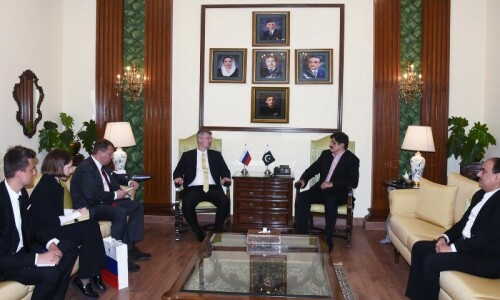KARACHI, March 18: Shakespeare’s profundity can be matched by only a few. And to present his thoughts Zia Mohyeddin, the connoisseur of words, did justice to the dramatist and bard’s views. There was complete silence in the hall as the rapt audience tried to catch each word that Zia Mohyeddin uttered with silken ease.
He was in his element as he presented Shakespeare’s thinking and excerpts from the bard’s plays, and the listeners were certainly not disappointed with the results. Since he is a true veteran of the art of elocution, one is never bored with Mohyeddin’s performance however many times one has heard him in the past.
The Shakespeare Association of Pakistan, in collaboration with the British Council, held ‘An Evening with Zia Mohyeddin’ on Tuesday at a local hotel. The Provincial Director of the British Council, S. Mashood Rizvi, remarked that it was heartening to see people taking an interest in the works of Shakespeare in Pakistan and youths, who have distanced themselves from such activities, being engaged.
In his welcome address, Professor Rafat Karim, President of the Shakespeare Association of Pakistan, said that Shakespeare wrote solely for the stage but his work is universal as his views are timeless. Dr Karim is a Shakespearean scholar and was the first person from Asia to be elected a member of the Executive Committee of the Australia and New Zealand Shakespeare Association in 1992. He is actively involved in the Shakespeare conferences held internationally, his last one being on ‘Islam on Shakespeare’s Stage’ held in Stradford-on-Avon, the birthplace of Shakespeare.
The first segment of the programme consisted of songs and sonnets presented by Khulood Mazhar and Aliya Rizvi, followed by their Urdu translations by Dr Iftikhar Shafi which went down well with the audience as did the lilting songs.
The much-awaited second segment began with the presentation on Shakespeare by Zia Mohyeddin. Mohyeddin’s rich experience comes from years of active participation in the performing arts. The founder of Reader’s Theatre, he started his career in the genre with selections from English poetry which he performed on radio and television in his early days in England. He later adapted the discipline of the western genre of reading to Urdu prose and poetry.
In his inimitable style, Mohyeddin talked about the ‘Legend in his lifetime,’ Shakespeare, and that it was his father who introduced him to the bard because he would quote him all the time, his favourite quote being ‘Oh what a rogue am I’. His teacher put him off the dramatist but later on in England he was hooked to him when he saw Richard Burton perform in one of his plays. In between the discourse, Mohyeddin read excerpts from his favourite plays and also read an Urdu translation of Julius Caesar by Hafeez Jawaid which the audience enjoyed immensely.
Commenting on Shakespeare’s blank verse, he said one understood the meaning in the second half of the couplet and gave an example.
Life is the wave which makes towards the pebbled shore,
So do our minutes hasten to their end.
His views on life were simple and for everyone, whether it was the passion of a lover or the softness of the beloved’s words, or the weakness of great kings, that he wrote about.
Mohyeddin focussed on two of the writer’s greatest plays, King Lear and Hamlet. Lear’s period which was pre-Christian focussed on the generation gap and the old order struggling with the new, and conveyed grandeur, fury and arrogance of an old man. Whereas Hamlet explores every conceivable aspect of life where the hero Hamlet assesses his views, the irony and falsity of everything.
Mohyeddin at the end of his discourse said that Shakespeare’s simple language had made an impact on him and phrases such as ‘wild goose chase’, ‘be all and end all’ and ‘milk of human kindness’ coined by Shakespeare, are common even today.
All in all it was an evening enjoyed by all as the complete silence throughout the programme indicated.











































Dear visitor, the comments section is undergoing an overhaul and will return soon.